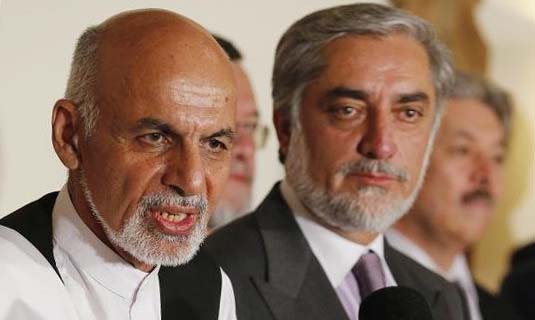A slew of news reports coming out of Afghanistan in the past week have picked up two dominant themes: Afghans are frustrated that the new government has still not selected a cabinet, and they now attribute the ongoing economic and security crisis to the fact that no ministers have been appointed to oversee these important ministries.
Three months after a drawn-out and controversial election, only three new figures have been appointed to government -- Ashraf Ghani as president, Abdullah Abdullah as “chief executive officer” and Hanif Atmar as national security advisor. The rest of the sitting officials in government were appointed by President Hamid Karzai and are currently serving in an “acting” capacity.
The appointment of new ministers is subject to a tense and complex negotiation between Ghani and Abdullah, as they try to implement the power-sharing deal brokered by U.S. Secretary of State John Kerry to end the electoral crisis last July. The problem is that they have different views of the relative powers of the presidency and the CEO position, the ideal qualifications for cabinet positions, and about how to resolve these differences. They also both have camps of followers who backed them in the election and expect some reward. By essentially splitting the government in two, neither politician can fully deliver on his promises.
But the inability to resolve these problems is quickly undermining the legitimacy of this government and the two men who are supposed to lead it. Neither is benefitting from this situation, but it is likely that Ghani will pay the higher price.
In the first month after Ghani’s inauguration, delaying the formation of a cabinet probably worked to his political advantage. The new president was able to make several well-received major decisions, such as signing the Bilateral Security Agreement with the U.S., and received popular support for his blitz of reforms and hands-on, detail-oriented approach to governance.
Furthermore, this go-it-alone style put Abdullah in a difficult position: either he could protest Ghani’s popular decisions, complaining that they were made without due consultation, or he could passively endorse them. Both postures made him look small. According to the power-sharing deal, Abdullah’s formal power stemmed from his role chairing the Council of Ministers. As long as there were no ministers, there was no Council, and nothing to chair. Ghani had the upper hand.
Now circumstances have changed. A spate of terrible security incidents in Kabul over the last month highlighted that no one was at the helm of the key security ministries – interior, which oversees the police, and the defense ministry that should command the military. The economy is also tanking. People are afraid to go out and shop because of the insecurity. A serious fiscal deficit is worsened by continued filching of customs and tax revenues by officials who do not know if they will have a job once new ministers are appointed. Ghani has promised donors to fire corrupt officials, but he can’t implement that pledge until he has a leadership structure that can hire new officials and hold them accountable.
Ghani’s executive style is beginning to look less like that of a technocrat with a plan and more like the Queen of Hearts, the frightful monarch in Lewis Carroll’s Alice in Wonderland who famously blusters, “Off with their heads!” Ghani’s technocratic vision, energy, and honesty are well-known, as is his prickliness. On the campaign trail, he seemed to have learned how to become a democratic politician. The remaining question was had he also learned how to become an effective leader.
The inability to form a cabinet and his recent testiness with the media make it seem that his initial executive blitzkrieg was never a political calculation to begin with, but in fact a long-suspected inability to govern collaboratively and delegate power. Even if in reality the blame for a lack of cabinet lies as much with Abdullah’s side as with Ghani’s, it is the president who will ultimately be seen as being responsible for making this government work. In the meantime, Abdullah has weathered the initial month of Ghani’s popularity. His natural air of statesmanship – he has been a foreign minister in the past, after all -- is an increasingly attractive contrast to Ghani’s freneticism. And to the extent that Ghani is blamed for not securing a cabinet, Abdullah can exact greater concessions in the internal negotiations.
As Western diplomats have pointed out, forming a cabinet is never easy even under normal circumstances. It is tremendously complex in Afghanistan’s current circumstances. But because the election was so divisive, and the process of constructing a political deal so lengthy and acrimonious, it is paradoxically even more important that the signatories to the agreement settle on an effective cabinet with a minimum of friction and delay.
Afghans want to know who is in charge of their economy and their security -- as both continue to worsen -- and they want a president who inspires confidence in his ability to lead. So far, these recent news reports suggest, they do not have the former and are losing hope about the latter.

